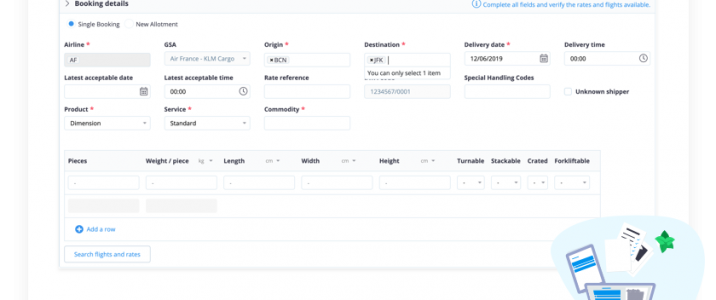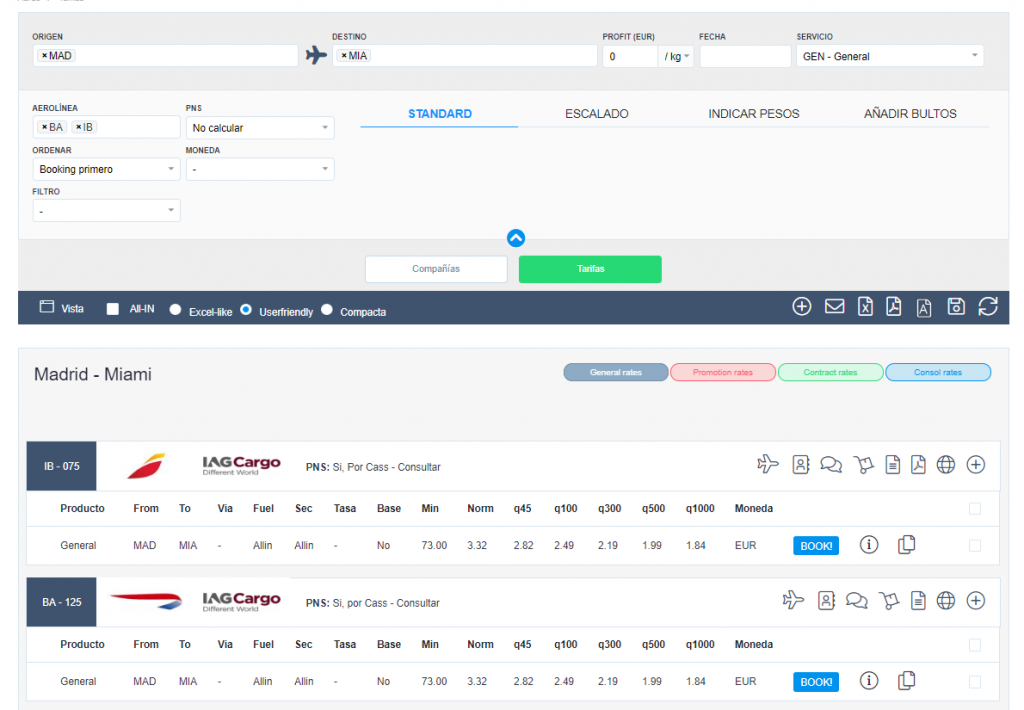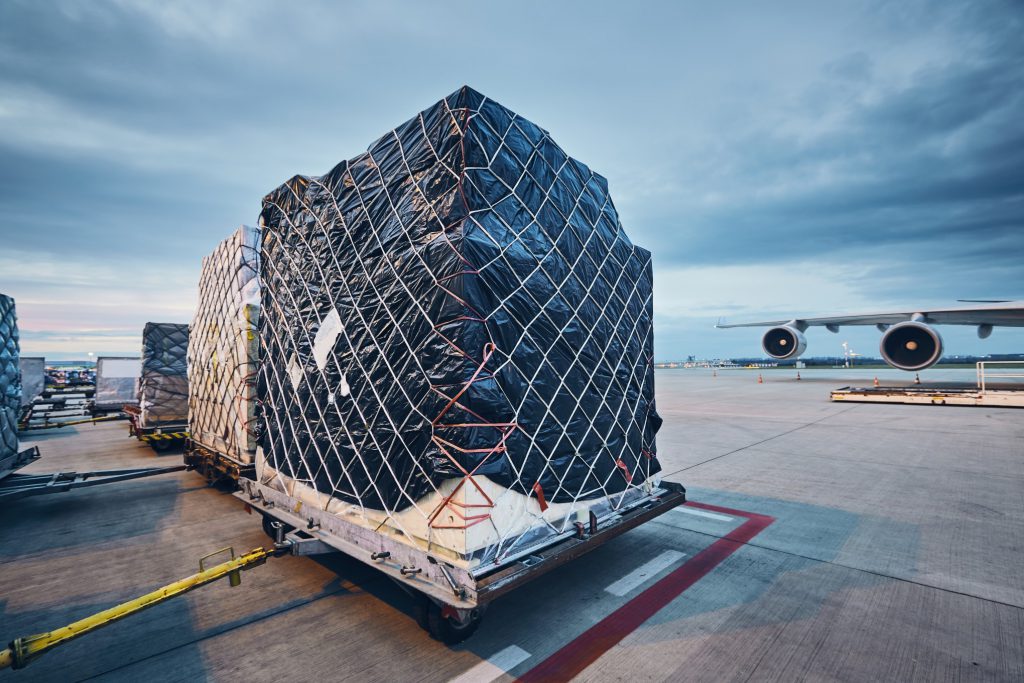Air Cargo eBooking: The Air Cargo Booking System & Procedure

In this article, you’ll learn:
- What air cargo eBooking is and how it evolved
- The evolution of air cargo digitization compared to other industries
- The role that airlines have played in bringing global cargo online
- The benefits of using platforms that enable eBookings across multiple airlines
If you’re in air cargo, it’s hard not to come across the word eBooking.
Over the past three years, more and more airlines have enabled customers to book air cargo online. There are now over 15 airlines offering cargo eBooking, including SAS, Lufthansa and subsidiaries, the IAG group, Air France/KLM, and Delta Cargo. United Cargo is currently building a portal for eBooking cargo and more and, of course, third-party air cargo eBooking websites are proliferating.
Everywhere you look, eBooking cargo seems like the wave of the future.
But first, what is air cargo eBooking?
Simply put, air cargo eBooking is fully electronic booking for air cargo. The entire transaction, from booking request to payment, is carried out online. By simply inputting your details, like airport pair, weights, dimensions, and dates, you can book a cargo slot on an airplane with a confirmation from the airline. Air cargo eBooking vastly streamlines the air cargo booking process, so it can be completed in minutes instead of days.
eBooking for air cargo starts with a direct connection between the forwarder and carrier, which transmits the booking request in real-time to the carrier, and the carrier’s response to the forwarder moments later. The booking request is integrated with the carrier’s internal booking system, and ideally their capacity system as well. No different than buying a book on Amazon, or ordering a taxi on Uber. The direct connection enables a real-time air cargo booking, and immediate response.
[optin-monster slug=”naongpfzyf5uzghn5lfa” followrules=”true”]
Why it’s actually behind the times
The word eBooking is a little funny, when you think of it.
It’s 2019. When you book a flight or hotel online, you don’t eBook. You book. That’s because for flights and hotels, booking online is how it’s done– and has been for decades. Not only that, when you buy your airline ticket online, the reservation is entirely electronic – computers monitor seat availability, payments, seat assignment and so on.
But eBooking cargo is different – even when cargo eBooking is offered, it is very often not fully electronic. Capacity information, for example, is only available electronically on Air France/KLM and select others.
Why is air cargo so different?
The Infrastructure Is Just Not There
Each airline uses a different tech stack – and often multiple, unintegrated tech stacks at that. Capacity information is often in a different “software silo” than bookings. Payments are in another. The different software systems are not talking to each other. Even if an airline digitized its booking system, it would have to digitize both the payments and the capacity system, and then integrate it with the booking system to be able to offer truly electronic air cargo booking.
END LOGISTICS NEGLECT. Digitizing in 100 seconds with WebCargo
Trust Is Important
Not all industries are equally open to change. We easily transfer money to friends and freelancers by tapping buttons on smartphones; but when it comes to things like medicine or daycare providers, people are not as excited to move online.
Commodities are disruptable. Straightforward services are easy to disrupt. Services that depend on trust are harder to change.
Take freight forwarding.
Shipping seems like a straightforward service – you can send 100kg of jewelry from Paris to New York on over a hundred different airlines. But here is more to moving goods than meets the eye. Forwarders build businesses with clients based on trust, and in turn, need to trust the logistics providers they use. So, in our example, not all those hundred different airlines are the same! Forwarders who have a good relationship with an airline will use that airline’s services, even if they are more expensive, or perhaps slower. But, if using that airline means a customer’s shipment sits in the airport for a week and their supply chain goes haywire, that forwarder will lose a customer – and their reputation. When survival depends on trust, change comes slowly. Trust, in freight forwarding, is currency.
As a result, carriers neglected logistics technology for years. There was no push from forwarders for airlines to modernize their services, as their customers preferred human interaction on the phone to ensure their shipments were properly processed. Dependability, honesty, and trust were worth far more to forwarders than speed, cost, and ease of use. The fact that cargo typically only represents a fraction of airline revenue certainly didn’t help either.
Why is air freight digitizing?
The B2B space has started to realize that trust can be imparted digitally just as well as it can be reflected personally. Airbnb shows mutual Facebook friends on listings, Alibaba provides trust badges, and nearly every marketplace in the world showcases reviews, reliability metrics, and activity rankings.
These build trust. And they do it with hard data, not golf games.
Airlines have begun to modernize in an effort to maximize revenue, decrease costs, and provide a smoother customer experience. Shippers looking for a faster, smoother customer experience are pushing forwarders to adopt eBooking. But even with all the advancement, forwarders are hesitant to embrace the change. Much as travel agents still exist over 20 years after website air travel tickets, it takes time for people to buy into something new.
And that means there’s an opportunity for the early adapters.
[optin-monster slug=”vpzcftf4ur8md6t6qyh1″ followrules=”true”]
Moving Forward
Change brings opportunities. Airlines offering cargo eBooking are first to market with a new sales channel – capturing market share with little competition. Forwarders who embrace eBooking are first to gain the benefits, saving time and money by cutting labor costs, shortening the time needed to quote customers by up to 65% and boosting productivity by 15% or more. Those gains, in turn, translate to happier customers who book more.
Managing change is never easy. But opportunities are there for forwarders who embrace eBooking cargo.
WebCargo: The Path Forward
Adopting eBooking has never been easier than with WebCargo Sky. Sky is free – it removes the cost considerations in adopting eBooking. Sky is more than just an eBooking tool – it also provides air cargo rates from 370+ airlines. WebCargo has been a trusted logistics tool for over a decade, with 1,500 forwarders using our products including industry leaders like Panalpina, CH Robinson, FedEx, Nippon Express, and Kuehne+Nagel. We know you need to trust your tools the way you need to trust your providers, and we work with those providers hand in hand to ensure smooth and effortless air cargo eBooking for all.
Thinking of moving forward? Sign up for WebCargo Sky today.

